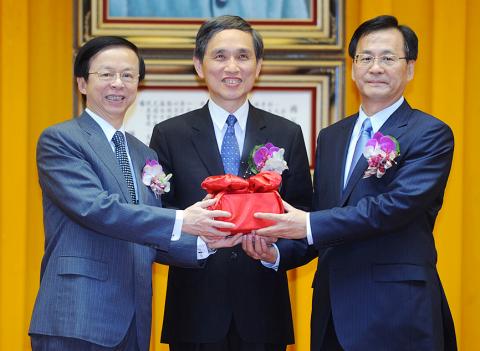Vice Minister of Economic Affairs Hwang Jung-chiou (黃重球) said a priority for Taiwan Power Co (Taipower, 台電) is to renegotiate the terms of contracts with independent power providers after he formally became the state-run utility’s chairman yesterday.
During a handover ceremony, he vowed to reverse the public’s negative sentiment toward the company, but declined to comment on a probe by the Agency Against Corruption on the company’s construction of the Fourth Nuclear Power Plant in Gongliao District (貢寮), New Taipei City (新北市).
The agency yesterday raided the power plant’s construction division and questioned five Taipower officials over the project’s procurements.

Photo: Liao Chen-huei, Taipei Times
Hwang replaced Edward Chen (陳貴明), who resigned on May 5 after six years on the job following widespread complaints of inefficiency and waste at the company.
The complaints were sparked by the company’s planned increased to electricity rates — which will be gradually introduced in three phases beginning on June 10 — as Taipower aims to cut its heavy losses.
“Taking the post of Taipower chairman is not an easy job at this time, but I will face the challenge and turn the crisis into an advantage,” Hwang said.
Taipower, the nation’s largest electricity supplier and monopoly grid operator, incurred net losses of NT$36 billion (US$1.2 billion) in 2010, a 167 percent increase from NT$13 billion in 2009, according to statistics posted on the company’s Web site. The company has accumulated NT$150 billion in net losses as of the end of last month.
Minister of Economic Affairs Shih Yen-shiang (施顏祥), who presided over the ceremony, said Taipower began losing money in 2006 because of rising international oil prices. While the company increased rates in 2006 and 2007, the increases were not enough, he added.
Hwang said Taipower had been under fire because of public misunderstanding of the utility’s operations, but acknowledged that there is room for improvement.
To improve the public’s perception of the company, Hwang said he would ensure full disclosure of information, effective communication with the public and flawless management.
In addition, the company would strictly follow measures proposed by a Ministry of Economic Affairs-organized task force to improve its to overall efficiency, he said. The task force is expected to deliver a report next month.
Hwang said he would also focus on transparency of electricity rates, procurement and fuel costs, and boost the company’s communication with the public, despite the complexities involving power generation and supply.
“I will make the company watch everything it spends, like a household does,” Hwang said, adding that he would enhance employees’ participation in the operations of the utility.

SELL-OFF: Investors expect tariff-driven volatility as the local boarse reopens today, while analysts say government support and solid fundamentals would steady sentiment Local investors are bracing for a sharp market downturn today as the nation’s financial markets resume trading following a two-day closure for national holidays before the weekend, with sentiment rattled by US President Donald Trump’s sweeping tariff announcement. Trump’s unveiling of new “reciprocal tariffs” on Wednesday triggered a sell-off in global markets, with the FTSE Taiwan Index Futures — a benchmark for Taiwanese equities traded in Singapore — tumbling 9.2 percent over the past two sessions. Meanwhile, the American depositary receipts (ADRs) of Taiwan Semiconductor Manufacturing Co (TSMC, 台積電), the most heavily weighted stock on the TAIEX, plunged 13.8 percent in

A wave of stop-loss selling and panic selling hit Taiwan's stock market at its opening today, with the weighted index plunging 2,086 points — a drop of more than 9.7 percent — marking the largest intraday point and percentage loss on record. The index bottomed out at 19,212.02, while futures were locked limit-down, with more than 1,000 stocks hitting their daily drop limit. Three heavyweight stocks — Taiwan Semiconductor Manufacturing Co (TSMC, 台積電), Hon Hai Precision Industry Co (Foxconn, 鴻海精密) and MediaTek (聯發科) — hit their limit-down prices as soon as the market opened, falling to NT$848 (US$25.54), NT$138.5 and NT$1,295 respectively. TSMC's

TARIFFS: The global ‘panic atmosphere remains strong,’ and foreign investors have continued to sell their holdings since the start of the year, the Ministry of Finance said The government yesterday authorized the activation of its NT$500 billion (US$15.15 billion) National Stabilization Fund (NSF) to prop up the local stock market after two days of sharp falls in reaction to US President Donald Trump’s new import tariffs. The Ministry of Finance said in a statement after the market close that the steering committee of the fund had been given the go-ahead to intervene in the market to bolster Taiwanese shares in a time of crisis. The fund has been authorized to use its assets “to carry out market stabilization tasks as appropriate to maintain the stability of Taiwan’s

In a small town in Paraguay, a showdown is brewing between traditional producers of yerba mate, a bitter herbal tea popular across South America, and miners of a shinier treasure: gold. A rush for the precious metal is pitting mate growers and indigenous groups against the expanding operations of small-scale miners who, until recently, were their neighbors, not nemeses. “They [the miners] have destroyed everything... The canals, springs, swamps,” said Vidal Britez, president of the Yerba Mate Producers’ Association of the town of Paso Yobai, about 210km east of capital Asuncion. “You can see the pollution from the dead fish.